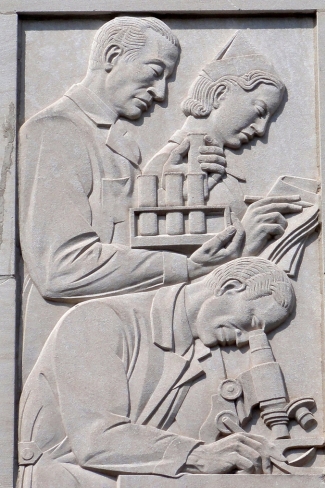9 March, 2016
We want scholars who mainly write for each other; that’s how they come up with something worth saying to everyone else.
On February 11, a team of scientists announced that they had recorded the sound made by two black holes colliding. Despite all the noise in the universe, their sensitive equipment found evidence of ripples in space-time, a core element in Albert Einstein’s general theory of relativity. It was an amazing testament both to the power of the human imagination and to the daily work of basic scientific research. It took decades of painstaking effort, and the commitment of scientists who spent their careers seeking to understand something most of us did not even know was being studied. One of those scholars, the Cal Tech physicist Kip Thorne, commented in The New York Times: “It’s as though we had only seen the ocean’s surface on a calm day but had never seen it roiled in a storm, with crashing waves.”
Intrigued by his remark, I looked up some of Thorne’s scholarly articles. I have a Ph.D. in history, but I was almost a geology major and I’ve always appreciated scientific research. Yet I must admit, I could not make sense of his scholarly writing. It was filled with jargon and formulae.
Was that my fault? Was it the fault of Thorne and his coauthors? Was it, as Steven Pinker wrote in these pages, because academic writing stinks? Or is it in the nature of scholarship to be challenging to the uninitiated because academics write at the edges of what is known? My own understanding of physics is far, far — light years perhaps — away from that of Thorne and his colleagues. And yet I am thankful for all of their work.
Plato mocked rhetoric. He believed that rhetoric, because it taught people to speak with the public, could never get out of the cave of shadows. Truth and goodness required leaving the ordinary world behind, emerging into the sun, and trying, however imperfectly, to get a sense of its beauty. The philosopher would never be able to return to the cave; indeed, he or she would have to be forced to do so for the good of everyone else, Plato famously argued inThe Republic. But philosophers, having seen truth, will struggle to speak with people who remain enamored by shadows. Worse, the people will distrust them. The people will accuse them of attacking their idols. The philosopher could end up, as did Plato’s mentor Socrates, killed.
That was an extreme response to the question of the relationship between the public sphere and truth, but it speaks to a real problem. The public is not composed of philosophers. The public has its idols and wants them to be respected even if, from an academic perspective, they are just shadows. Yet in a democracy, one cannot imagine the public as nothing more than ignorant or impassioned. One must also recognize the majesty of the people, and that democracy is the aspiration that we ordinary people, as citizens, are able to govern ourselves. Plato was no democrat. We are.
Democratic deliberation needs philosophy, because deliberation that relies on falsehood will lead to disaster. And to gain truth, Plato was right, we need to allow philosophers to pursue it even when unpopular. We need to permit scholars to study human evolution or global warming. We need to be able to tell the truth about history, not because doing so is joyful but because it is how we can come to terms with our present condition. As James Baldwin wrote in 1965, it is only “in great pain and terror one begins to assess the history which has placed one where one is and formed one’s point of view.”
So, yes, scholars must engage the public. In doing so, however, they must respect the integrity of public conversations that have their own traditions and icons, heroes and villains. “The nation,” Ernest Renan wrote in 1882, “is a soul” sustained by “a rich legacy of memories.” Public conversations, like academic ones, rely on the shared reference points of a common culture. Public rhetoric requires starting where we as a people are and then bringing us where the speaker or writer believes we need to be. It is a democratic practice.
It is very hard to engage in rhetoric and philosophy at the same time. That was something Cicero understood. He recognized that many people shared Aristophanes’ depiction of philosophers in his play The Clouds. Philosophers were lost in airy, arcane pursuits that had no bearing on the needs, aspirations, and lives of most citizens. Yet, Cicero responded inThe Ideal Orator, however funny it is to insult philosophers for being inaccessible, that only takes us so far. The real problem is that rhetorical and philosophical activity are fundamentally different: “The procedures of oratory lie within everyone’s reach, and are concerned with everyday experience and with human nature and speech.” Scholarly inquiry, on the other hand, “draws as a rule upon abstruse and hidden sources.” In philosophy, “the highest achievement is precisely that which is most remote from what the uninitiated can understand and perceive, whereas in oratory it is the worst possible fault to deviate from the ordinary mode of speaking and the generally accepted way of looking at things.”
Ancient writers and Renaissance humanists both struggled with how to bring rhetoric and philosophy together. They mocked writing that they believed lacked beauty. They wondered how the insights of philosophy might be made useful to public life. They hoped that there was an alternative to, in Cicero’s words, the philosopher’s “inarticulate wisdom” and the uninformed citizen’s “babbling stupidity.” Effective speech without wisdom was no better than wisdom that remained in the clouds.
We want physicists who write for each other. I appreciate that, at conferences and in academic papers, they have challenged each other’s conclusions and, in doing so, have pushed forward the boundaries of knowledge. Yet I am also grateful for my scientist friends who posted on Facebook links to videos and essays in which scientists explained, in terms that I could understand, why it was so significant that we had heard black holes colliding.
I enjoyed physicist Lawrence Krauss’s clear articulation of why a citizen like me — who could never understand an academic paper in physics — should continue to support investing oodles of money in basic research: “By exploring processes near the event horizon, or by observing gravitational waves from the early universe, we may learn more about the beginning of the universe itself, or even the possible existence of other universes.” This matters: “Every child has wondered at some time where we came from and how we got here. That we can try and answer such questions by building devices like LIGO to peer out into the cosmos stands as a testament to the persistent curiosity and ingenuity of humankind — the qualities that we should most celebrate about being human.”
I appreciate the scientists who have taken time to write for readers like me about the importance of hearing ripples in space-time. But I am also thankful for the many scientists who spend most of their time talking to each other. Instead of writing for me, they devoted their efforts to producing inaccessible scholarship that, over time, produced public insights of profound beauty.
By Johann N. Neem
Originally puplished here



 It has become a trope, a joke perhaps, to comment on how bad academic writing is. Thus, in a recent essay touting a program to help academics write more clearly for the public,
It has become a trope, a joke perhaps, to comment on how bad academic writing is. Thus, in a recent essay touting a program to help academics write more clearly for the public,